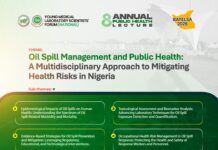The Medical Laboratory Scientists are Sct. AbdulMajid Musa and Sct. Bamidele Oluwafemi from the Nigeria Centre for Disease Control (NCDC) National Reference Laboratory.
The training is being organized by the Africa CDC at the Institute Pasteur in Dakar, Senegal.
 |
| The Scientists. Photo: NCDC |
2019 Novel Coronavirus (2019-nCoV) is a virus (more specifically, a coronavirus) identified as the cause of an outbreak of respiratory illness first detected in Wuhan, China. Early on, many of the patients in the outbreak in Wuhan, China reportedly had some link to a large seafood and animal market, suggesting animal-to-person spread.
Laboratory Testing of Novel Coronavirus
CDC has developed a new laboratory test kit for use in testing patient specimens for 2019 novel coronavirus (2019-nCoV). The test kit is called the “Centers for Disease Control and Prevention (CDC) 2019-Novel Coronavirus (2019-nCoV) Real-Time Reverse Transcriptase (RT)-PCR Diagnostic Panel.” It is intended for use with the Applied Biosystems 7500 Fast DX Real-Time PCR Instrument with SDS 1.4 software.
Signs and Symptoms of Novel Coronavirus
For confirmed 2019-nCoV infections, reported illnesses have ranged from people with little to no symptoms to people being severely ill and dying. Symptoms can include:
- Fever
- Cough
- Shortness of breath
CDC believes at this time that symptoms of 2019-nCoV may appear in as few as 2 days or as long as 14 after exposure. This is based on what has been seen previously as the incubation period of MERS viruses.
Prevention of Novel Coronavirus
There is currently no vaccine to prevent 2019-nCoV infection. The best way to prevent infection is to avoid being exposed to this virus. However, as a reminder, CDC always recommends everyday preventive actions to help prevent the spread of respiratory viruses, including:
- Avoid close contact with people who are sick.
- Avoid touching your eyes, nose, and mouth with unwashed hands.Stay home when you are sick.
- Cover your cough or sneeze with a tissue, then throw the tissue in the trash.
- Clean and disinfect frequently touched objects and surfaces using a regular household cleaning spray or wipe.
Follow CDC’s recommendations for using facemask.
- CDC does not recommend that people who are well wear facemask to protect themselves from respiratory viruses, including 2019-nCoV.
- Facemask should be used by people who show symptoms of 2019 novel coronavirus, in order to protect others from the risk of getting infected.
- The use of facemasks is also crucial for health workers and people who are taking care of someone in close settings (at home or in a health care facility).
- Wash your hands often with soap and water for at least 20 seconds, especially after going to the bathroom; and after blowing your nose, coughing, or sneezing.
- If soap and water are not readily available, use an alcohol-based hand sanitizer with at least 60% alcohol.
- Always wash hands with soap and water if hands are visibly dirty.












